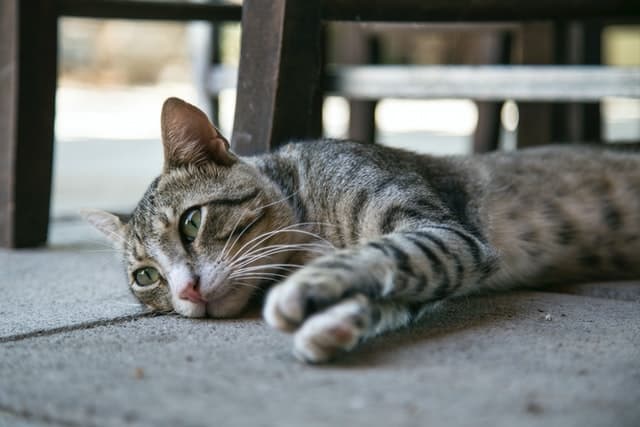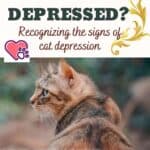
Depression is not an evil that can only affect humans, but some animals also suffer from it.
Depression is one of the most common ailments today, not only among people but also in non-human living beings. In fact, more and more animals can suffer from depression : this testifies once again how similar animals and people are, much more similar than we think.
In this article, we talk about six animal species that can suffer from depression. The examples we will show you will make us reflect on the fact that animals have emotions and feelings, just like people.
Why do we talk about depression?
Depression is a mental disorder characterized by a deep sadness that does not go away by itself and that interferes with the normal course of our life. This is the case for humans as well as for the rest of the species, since the brain mechanisms of emotions are similar, at least in mammals.
How can we know if an animal is depressed? For a psychologist, sadness is not only communicated with words. People with depression don’t always cry or have a pained expression: they can neglect their hygiene, stop eating, spend the whole day in bed, or even be aggressive. These symptoms are characteristic of all species.
Humans can talk to each other about how we feel, but unfortunately, animals don’t have this kind of verbal communication.
To assess their mental state, it is necessary to know, first, their normal behavior in the wild and, finally, to analyze and make a comparison with the events that caused the behavior change and how the animal shows it.
Animals that can suffer from depression
Here is a list of some animals that can suffer from depression. They are not the only ones, but they are the most representative and known.
1. Non-human primates
Primates are the cousins of man , the closest animals to humans and were among the first to be diagnosed with depression. The paradox is that their captivity, which is the cause of their depression, has turned into an opportunity to study their behavior and physiology associated with this disorder.
Numerous studies have shown that humans and great apes are so similar that when they are depressed, they look even more alike . The symptoms are truly amazing.
In captivity, a depressed primate exhibits behaviors such as inactivity, staring, stereotypy, and anorexia. It can also present mutilation, baldness and aggression towards its fellow men . Suicide attempts have even been documented.
Cases of depression in primates have also been recorded in nature, but they are often linked to stressful life situations, such as grieving the death of a loved one. Cases of post-traumatic stress disorder and anxiety disorders have also been highlighted in connection with these experiences.
2. Dolphins and other cetaceans
Even the dolphins living in captivity and are used for human entertainment have been shown to suffer from depression. Used to living in large groups and traveling long distances every day, when they are forced into social isolation, the health problems resulting from living in the pool and the lack of environmental enrichment end up deteriorating their mental health.
It is common to observe dolphins swimming erratically, bumping against the walls of the aquarium, losing their appetite or becoming immobile and listless when depressed. Many times, the injuries resulting from hitting the walls of the aquarium end up putting an end to the life of the animal. It has even been thought that these mammals are capable of committing suicide.
3. Dogs are among the animals that can suffer from depression
Dogs have lived with humans for centuries, so we know their emotionality more than others. Fortunately, there is even more awareness of their mental health today.
Depressed dogs exhibit behaviors such as apathy, anorexia and lack of motivation . It is important to make a good diagnosis, as canine depression often goes hand in hand with anxiety. A dog may exhibit aggressive and obsessive behaviors, such as excessive scratching or other stereotypical attitudes.
4. The cats
Cats are particularly sensitive to anxiety and can also suffer from depression. Felines are more likely than dogs to exhibit lethargic behaviors. Some of them are as follows:
- Lack of appetite.
- They don’t lick.
- They don’t want to play.
- They hide most of the time.
- They sleep too much or at unusual times.
5. The birds
It’s not just mammals that are depressed. Birds, especially herd birds, can suffer from depression due to events such as the death of a loved one or prolonged social isolation.
Symptoms vary by species, but the most striking cases occur among parrots . These birds often exhibit depression with symptoms similar to when they are physically ill: deplumation, ruffled feathers, anorexia or moulting. They can obsessively peck or be aggressive towards their fellows.
6. The elephants
The elephants have emotionalism deep and complex, as well as having strong family ties. The loss of their own kind and the isolation of captivity devastate the mental health of these animals. The cases of elephants locked up in zoos and consumed by depression and anxiety are unfortunately very many.
But it’s not just in captivity that elephants are animals that can suffer from depression. Studies on the African elephant ( Loxodonta africana ) have revealed that the offspring of mothers killed by poachers become aggressive towards humans due to trauma caused during their childhood.






